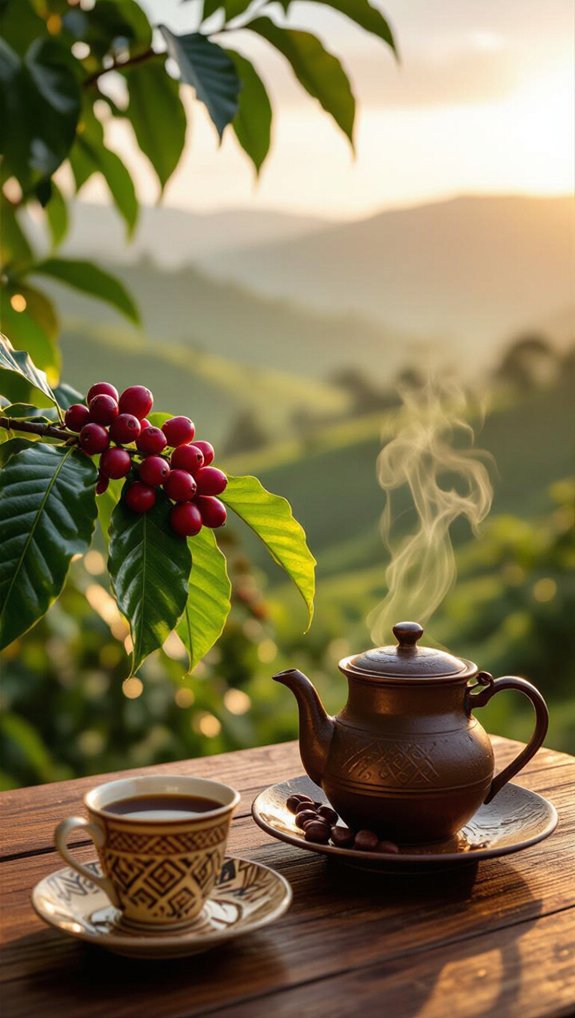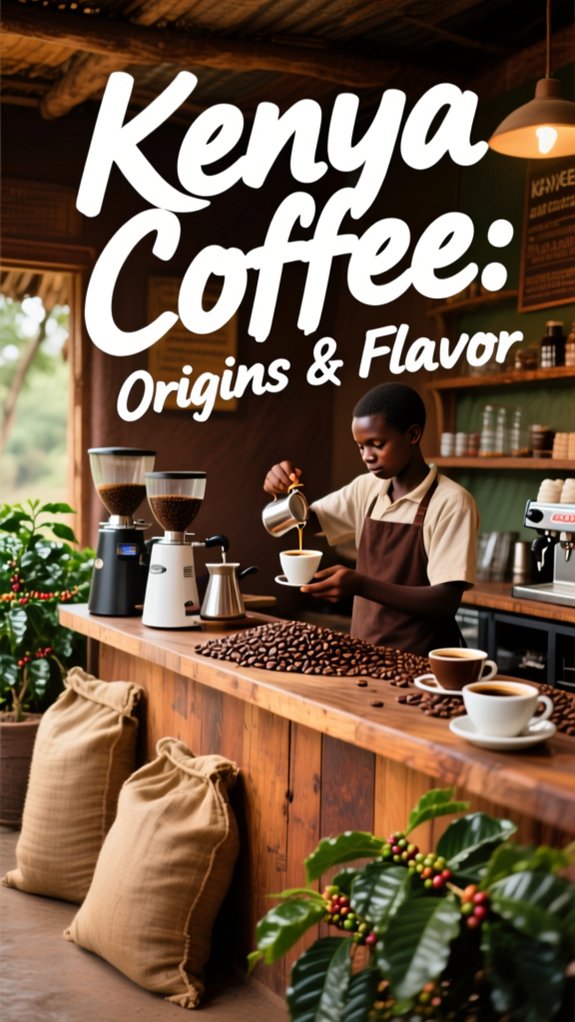According to the International Coffee Organization, Kenya produces approximately 50,000 metric tons of coffee annually, yet despite representing less than 1% of global production, Kenyan beans consistently command premium prices-often 20-30% higher than other African origins. This small East African nation has earned an outsized reputation among specialty coffee roasters and enthusiasts worldwide, but many coffee drinkers struggle to understand what makes Kenyan coffee so distinctive, where to find authentic beans, and how to brew them properly at home.
The challenge isn’t just about access-it’s about knowledge. With countless coffee options flooding the market and marketing claims that blur the lines between exceptional and ordinary, how do you identify genuine Kenyan coffee that delivers on its reputation? And once you’ve secured a bag of these prized beans, are you brewing them in a way that honors their unique characteristics?
This guide will walk you through Kenya’s fascinating coffee history, from its colonial introduction to its current status as a specialty coffee powerhouse. You’ll discover what creates that signature Kenyan flavor profile, learn to identify quality beans, and master brewing techniques that bring out the bright acidity, complex fruit notes, and wine-like body that make this origin truly exceptional.
Table of Contents
What is the history of Kenya coffee?
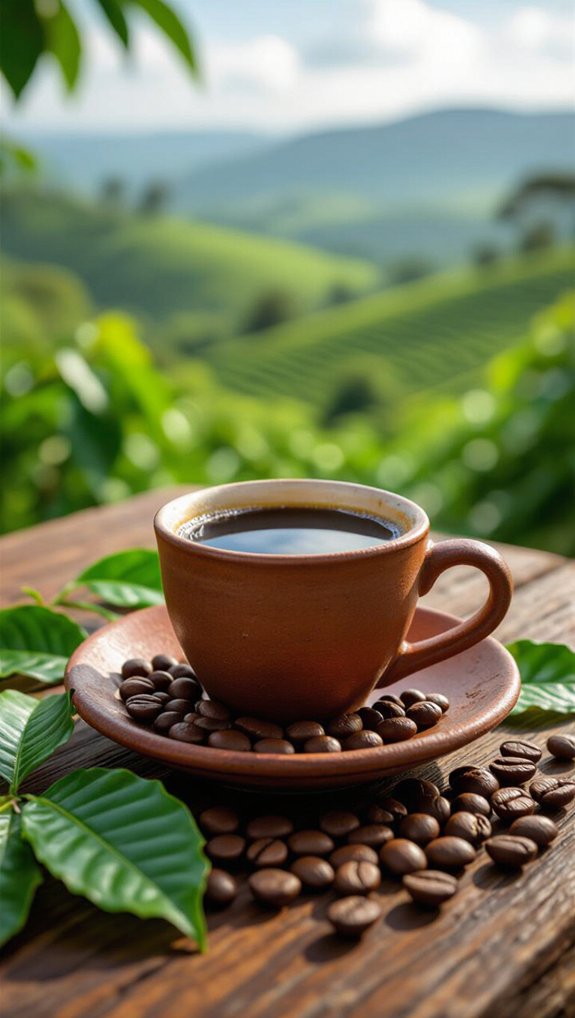
Kenya’s coffee history is a compelling narrative of colonial exploitation, agricultural innovation, and eventual economic transformation.
European missionaries introduced coffee in 1893, bringing Bourbon Arabica from Brazil and Reunion Island during British colonial rule. Initially, white settlers monopolized coffee cultivation, forcing indigenous Kenyans into plantation labor.
The landscape changed dramatically after independence in 1963 when President Jomo Kenyatta redistributed British-owned farms to local smallholders. This pivotal moment transformed coffee from a colonial enterprise to a national economic driver, with cooperatives empowering farmers and establishing Kenya as a premier coffee-producing nation. Today, volcanic soil and high altitudes make Kenya one of the most sought-after coffee-producing regions globally, with unique flavor profiles that distinguish its beans from other origins.
When did coffee arrive in Kenya?
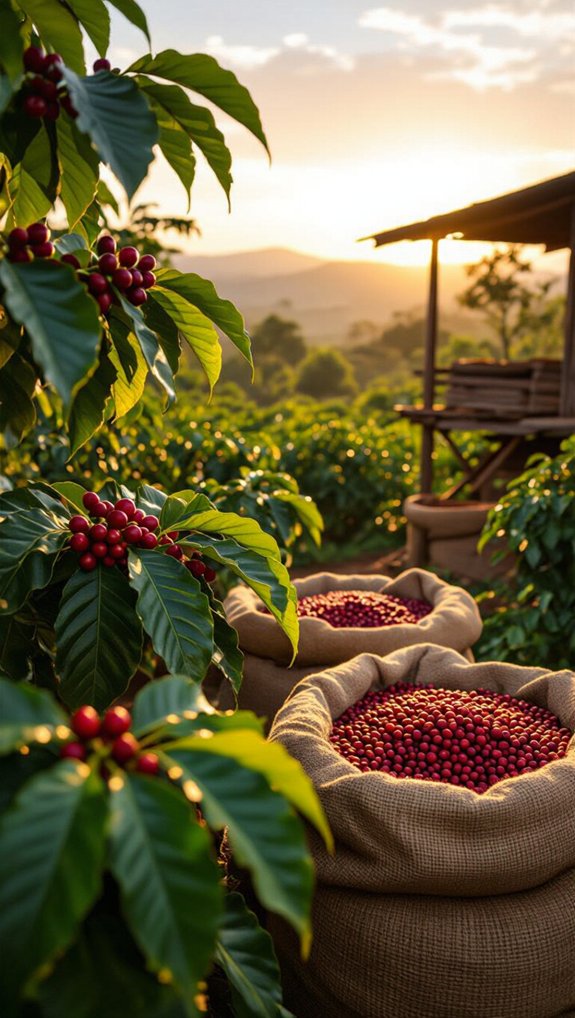
The arrival of coffee in Kenya traces back to 1893, when European missionaries first planted coffee seeds that would transform the nation’s agricultural landscape. These pioneers brought seeds from diverse origins, setting the stage for Kenya’s remarkable coffee journey. Scottish missionary John Paterson specifically introduced coffee seeds obtained from Smith Mackenzie & Co., agents stationed in Aden, marking a pivotal moment in Kenya’s agricultural development.
Key details about coffee’s initial introduction include:
- Missionaries from France and Scotland introduced the first seeds
- Initial plantings occurred in coastal regions like Kibwezi
- Seeds originated from Reunion Island and Yemeni ports
- First harvest happened around 1896
The introduction marked the beginning of Kenya’s rich coffee heritage, laying groundwork for its future as a premier coffee-producing nation.
Colonial era, missions, and early farms
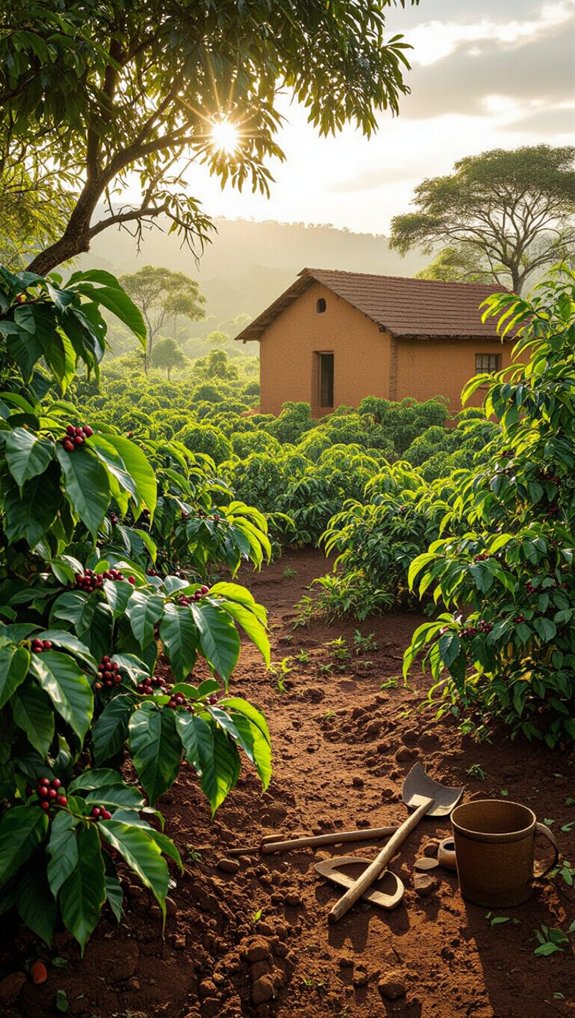
When missionaries first planted coffee seeds in Kenya during the late 19th century, they unknowingly sparked a transformative agricultural revolution that would reshape the region’s economic landscape. French missionaries from Reunion Island introduced Bourbon Arabica to locations like Bura, Kibwezi, and Thika, initially cultivating coffee for personal use and as a potential cash crop. First coffee seeds were imported from Reunion Island in 1893, marking a significant milestone in Kenya’s agricultural history.
The British colonial administration soon recognized coffee’s potential, establishing large-scale plantations predominantly owned by white settlers. These estates dramatically transformed Kenya’s central highlands, creating an export-driven agricultural model that relied heavily on indigenous labor under challenging working conditions.
How Kenya auctions shaped global fame
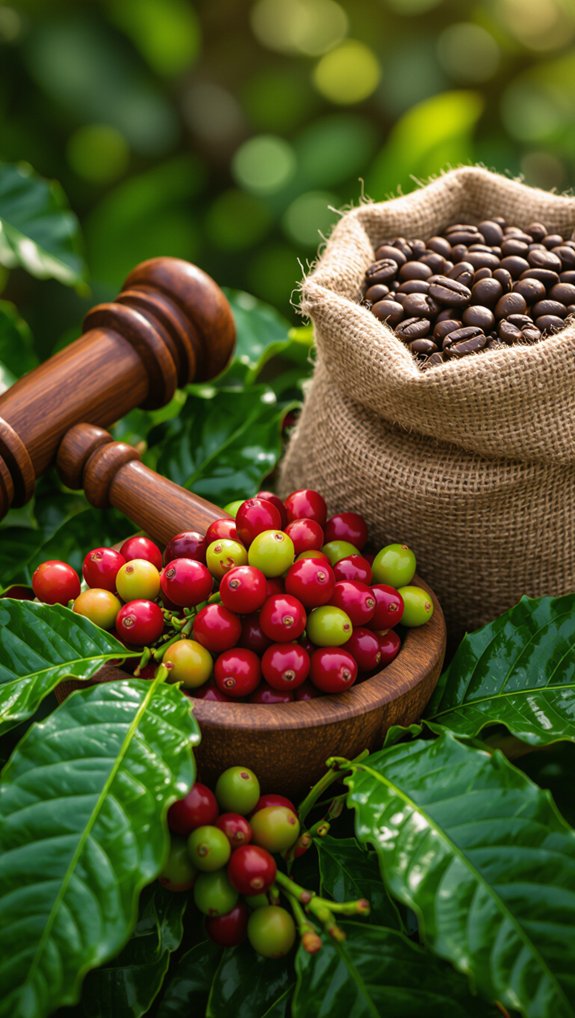
Pioneering a revolutionary approach to coffee trading, Nairobi’s auction system catapulted Kenyan beans onto the global specialty coffee stage, transforming how high-quality coffees are bought, sold, and valued worldwide.
The NCE’s transparent model redefined coffee commerce through:
- Open, competitive weekly bidding
- Precise sensory grading of each lot
- Traceability to specific washing stations
- Premium pricing for exceptional quality
Where did SL28 and SL34 start?
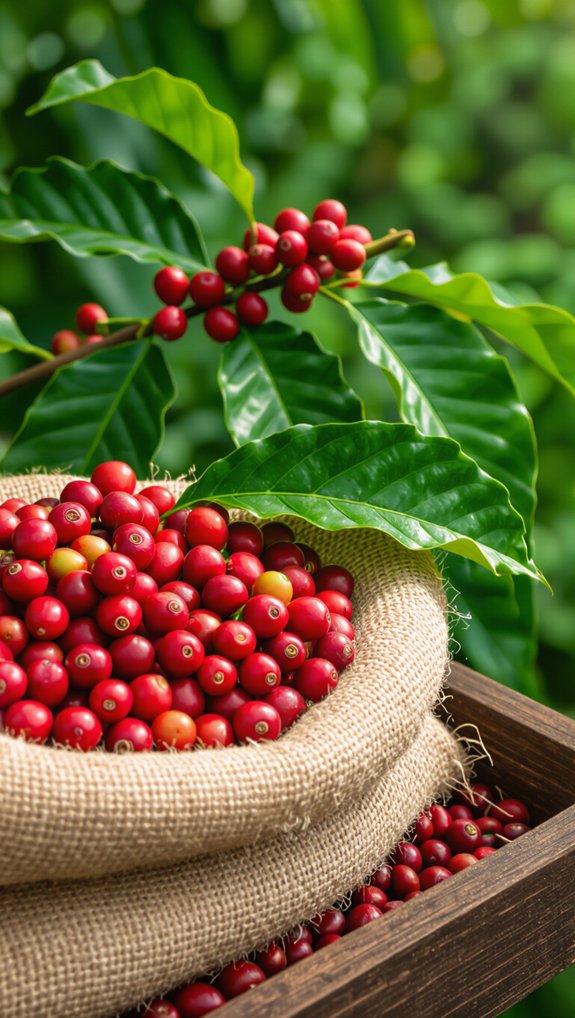
How did Kenya’s remarkable SL28 and SL34 coffee varieties first emerge from the dusty colonial research labs of the early 20th century? These legendary varieties were born at Scott Agricultural Laboratories during the 1920s and 1930s.
SL28 originated from a single drought-resistant tree in Tanganyika, selected in 1931, while SL34 came from a unique French Mission coffee tree on Loresho Estate in Kabete, Kenya.
Both varieties were meticulously developed to thrive in challenging Kenyan climates. They quickly became the backbone of Kenyan coffee production, representing approximately 80% of the country’s coffee output and establishing a global reputation for exceptional quality.
Flavor profile Kenya is known for

Why do coffee enthusiasts worldwide speak of Kenyan coffee with such reverence? Its extraordinary flavor profile sets it apart from other origins, delivering an unparalleled sensory experience:
- Vibrant black currant and berry notes create a juicy, wine-like complexity
- Bright, crisp acidity that dances on the palate with citrusy undertones
- Natural sweetness reminiscent of honey and caramel
- Full-bodied texture with a lingering, elegant finish
The unique combination of volcanic soil, high-altitude cultivation, and meticulous processing transforms Kenyan beans into liquid gold. Each sip tells a story of terroir, revealing why these coffees are celebrated by connoisseurs globally.
How to brew bright Kenya pour-over
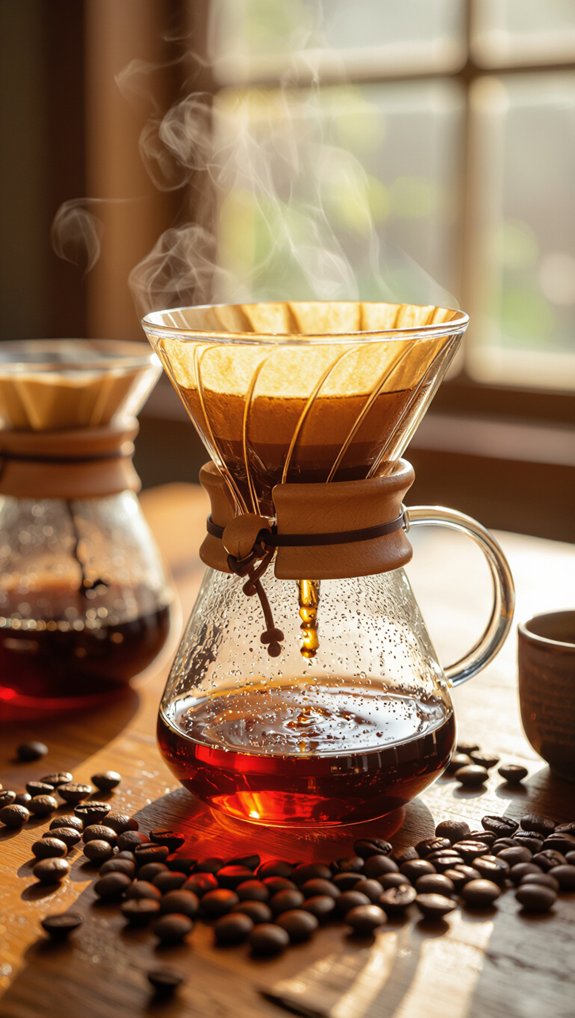
Brewing a bright, vibrant Kenya pour-over requires precise techniques that highlight the coffee’s signature citrusy and floral characteristics. I’ll walk you through selecting the right equipment, measuring your coffee-to-water ratio, and executing a pour-over method that captures Kenya’s exceptional flavor profile.
Ingredients
Unlock the vibrant essence of Kenyan coffee by selecting premium ingredients that transform your pour-over into a sensory masterpiece. Your brewing success depends on carefully chosen components that elevate each cup.
Key ingredients for a stellar Kenyan pour-over include:
- Fresh, high-grade Kenyan Arabica beans (preferably AA grade)
- Filtered water at 200°F
- Medium-coarse ground coffee
- Precision digital scale for accurate measurements
Choosing freshly roasted beans with bright, complex flavor profiles like blackcurrant and citrus ensures an exceptional brewing experience.
Matching these beans with precise water temperature and grind consistency unlocks the extraordinary potential of Kenyan coffee.
Equipment
Crafting the perfect Kenyan pour-over requires selecting precise equipment that transforms high-quality beans into a luminous, flavor-packed experience.
I recommend starting with a flat-bottom dripper like the Stagg X or Kalita Wave, which ensures even extraction and highlights the bright, acidic notes characteristic of Kenyan coffees.
A gooseneck kettle with temperature control is crucial-aim for 203°F to maintain consistent heat.
Pair this with a medium-coarse grind using SSP or Ode burrs, and you’ll unlock the complex flavors hidden within these exceptional beans.
Your equipment choices can make or break the brewing magic.
Instructions
Every exceptional Kenyan pour-over begins with meticulous preparation and a deep comprehension of the brewing process.
Crafting the perfect cup requires precision and passion. Here’s how to transform those vibrant Kenyan beans into a liquid masterpiece:
- Use a 1:16 coffee-to-water ratio (25g coffee to 400g water)
- Heat water to 200°F, ensuring optimal extraction
- Bloom grounds for 45 seconds, releasing CO₂
- Pour in controlled, circular motions, targeting total brew time between 3:00-3:30 minutes
Your reward? A bright, complex cup that showcases Kenya’s renowned coffee excellence.
Which coffee makers suit Kenya profiles
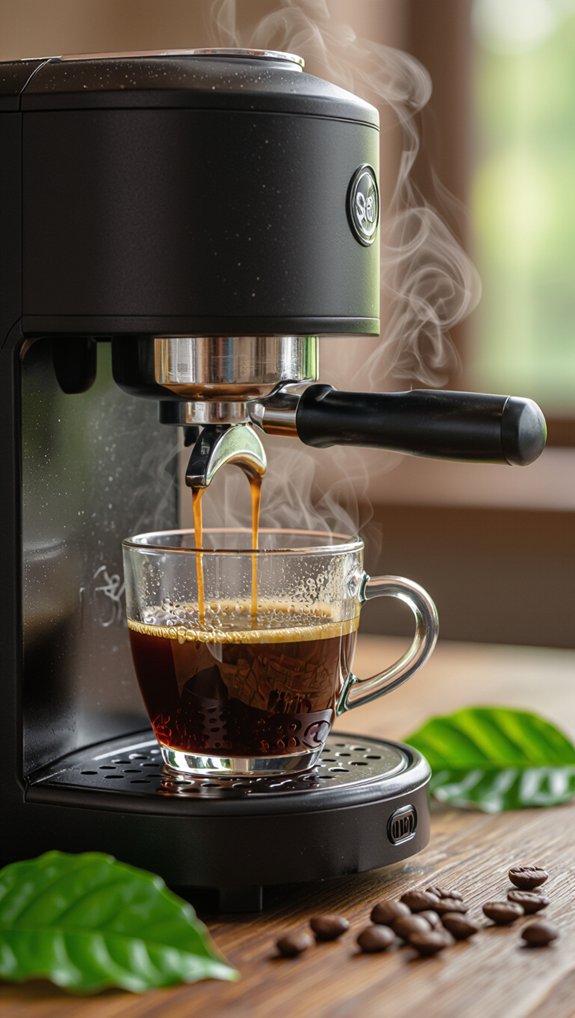
Navigating the world of coffee makers for Kenyan beans is like finding the perfect dance partner-each machine must complement the vibrant, complex character of these exceptional coffees.
Drip makers like Moccamaster and Breville shine by offering precise temperature control that highlights Kenya’s bright, fruity notes. For espresso enthusiasts, machines with pressure profiling and integrated grinders unlock the beans’ citrusy complexity.
Pour-over methods such as V60 remain ideal for preserving delicate flavor nuances. The key is selecting equipment that respects Kenyan coffee’s unique profile-delicate, acidic, and wonderfully complex.
Is Kenya coffee worth the price

Let’s dive straight into whether Kenyan coffee justifies its premium price tag. The incredible flavor profiles and global reputation make it a standout choice for coffee enthusiasts. Here’s why it’s worth every penny:
- Exceptional flavor complexity with bright, fruity notes
- Highest-priced agricultural export from Kenya
- Small-lot specialty coffees fetch premium global prices
- Unique terroir producing world-renowned taste profiles
International buyers consistently pay top dollar for these beans, with prices reaching $54 per kg. Despite high costs, the quality speaks volumes.
Roasters and boutique retailers recognize the unparalleled sensory experience Kenyan coffee delivers, making it a luxury worth investing in for true coffee lovers.
Today’s challenges, climate, and future paths
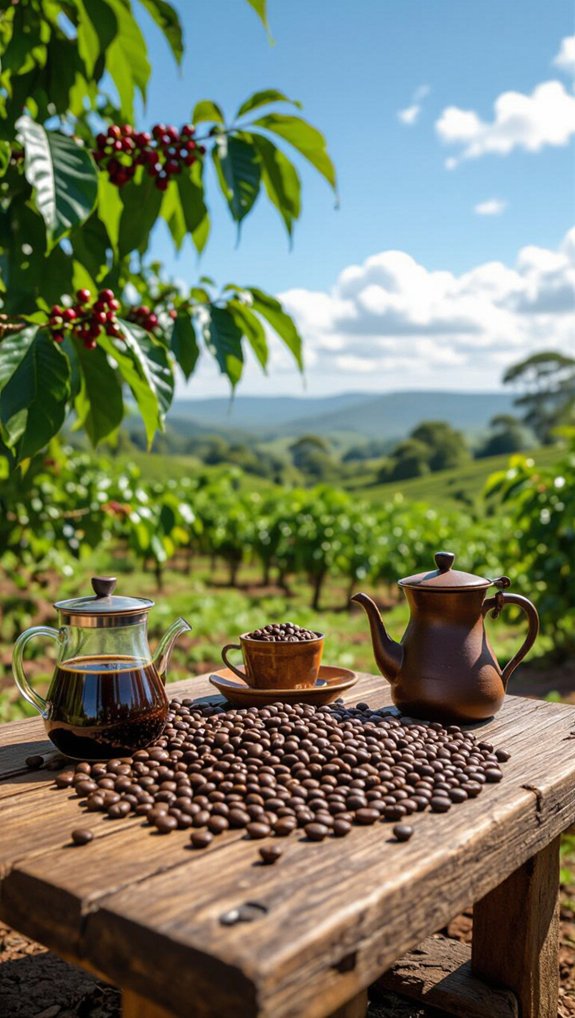
Kenyan coffee confronts a complex landscape of environmental, economic, and agricultural challenges that threaten its world-renowned reputation. Rising temperatures, erratic rainfall, and increasing pest pressures are shrinking suitable cultivation areas and reducing crop yields.
Smallholder farmers, earning less than $2.30 daily, struggle with fluctuating global prices and rising input costs, forcing many to abandon coffee farming. Despite these challenges, hope emerges through government interventions, cooperative support, and young farmers embracing innovative agronomy practices.
Projections suggest a potential 13.3% production growth in 2025/26, with increasing domestic consumption and strategic regional focus on quality coffee production.
Frequently Asked Questions
How Does Kenya Coffee Differ From Other African Coffee Varieties?
I’ll tell you straight: Kenya coffee stands out with its vibrant, wine-like acidity, distinctive blackcurrant notes, and complex flavor profile. Its high-altitude cultivation, unique double fermentation, and carefully bred SL varietals make it truly exceptional among African coffees.
What Makes Kenyan Coffee Beans More Expensive Than Others?
I’ll tell you why Kenyan coffee costs more: high-altitude volcanic soil, strict hand-picking, rigorous grading, complex processing, and disease-resistant varietals drive up production expenses. These premium practices ensure exceptional flavor and globally recognized quality that commands higher prices.
Can I Grow Kenyan Coffee Varieties in My Home Garden?
Yes, you can grow Kenyan coffee varieties at home if your climate matches their requirements: high altitude (1,400-2,000m), temperatures between 15-24°C, well-drained volcanic soil, and adequate rainfall. Ruiru 11 is particularly suitable for home gardens.
Why Do Specialty Coffee Shops Prefer Kenyan Coffee Beans?
I prefer Kenyan coffee beans for their exceptional flavor complexity, bright acidity, and ethical sourcing. Their unique berry and winey notes, combined with direct trade transparency, make them a premium choice that delights discerning coffee enthusiasts like myself.
Are There Any Organic Kenyan Coffee Farms or Cooperatives?
Yes, Kenya has numerous organic coffee farms! I’ve researched cooperatives like Baragwi, Rugi, and Thiriku that are leading organic certification efforts. They’re supporting over 15,000 smallholder farmers using sustainable practices and targeting premium international organic markets.
In Conclusion
Kenya coffee represents a remarkable journey of resilience, flavor, and global recognition that transformed from missionary plantings to world-renowned specialty beans. Its unique volcanic soil-grown Arabica, developed through careful breeding and transparent auctions, embodies more than just a beverage-it’s a cultural narrative of agricultural innovation. From SL28‘s distinctive bright acidity to complex flavor profiles featuring notes of blackcurrant and citrus, Kenyan coffee continues to captivate enthusiasts worldwide, symbolizing the country’s rich agricultural heritage and unwavering commitment to exceptional quality.
Understanding the history of Kenya coffee helps us appreciate why these beans command premium prices and devoted followings in specialty coffee shops around the globe. The combination of ideal growing conditions, meticulous processing methods, and generations of farming expertise has created a coffee experience that’s truly unmatched. Whether you’re drawn to the wine-like acidity or the full-bodied complexity, Kenyan coffee offers something extraordinary in every cup.
To fully unlock the potential of these exceptional beans, the right brewing equipment makes all the difference. Check out our coffee machine reviews to discover smart, well-reviewed options that will help you extract every nuanced flavor note from your Kenyan coffee, ensuring you experience these legendary beans exactly as the farmers and roasters intended.

